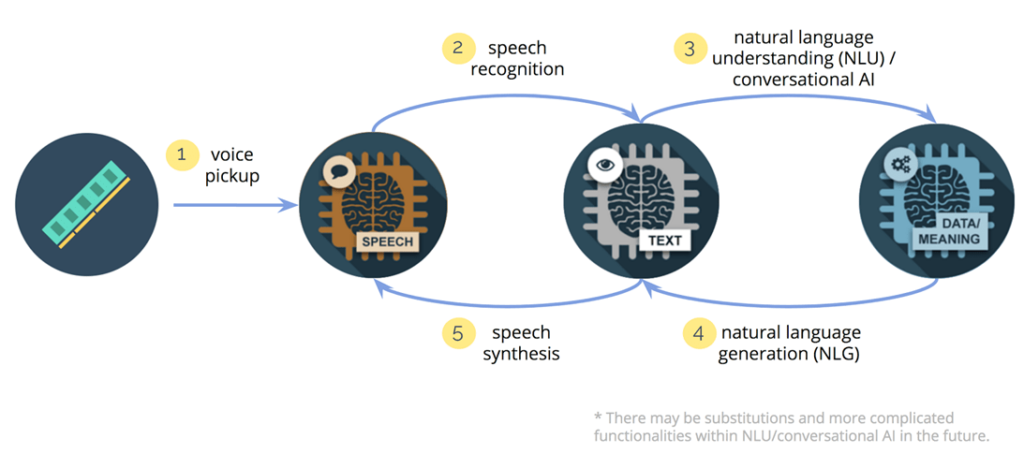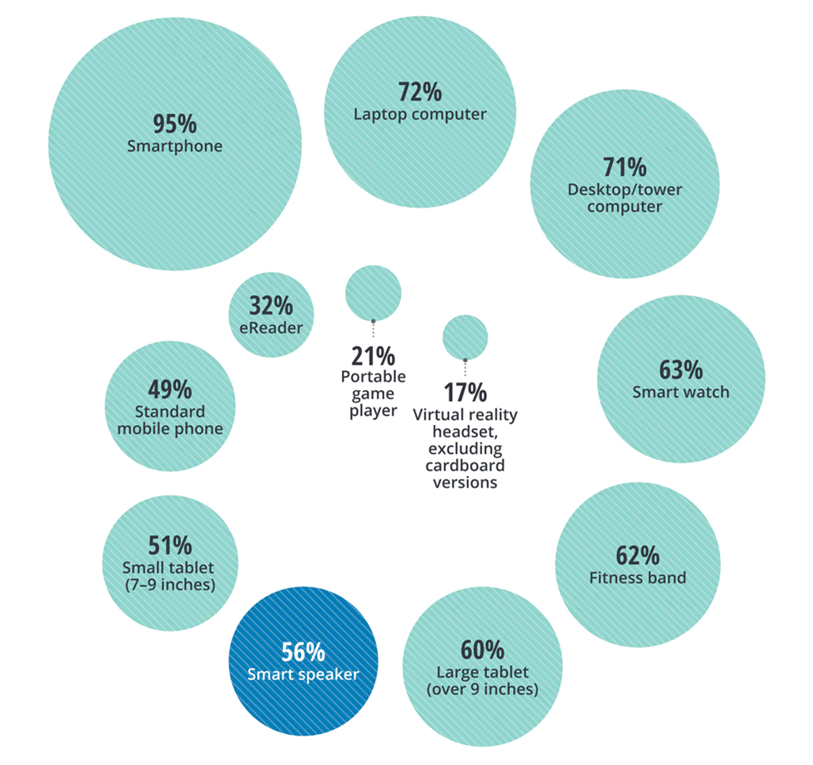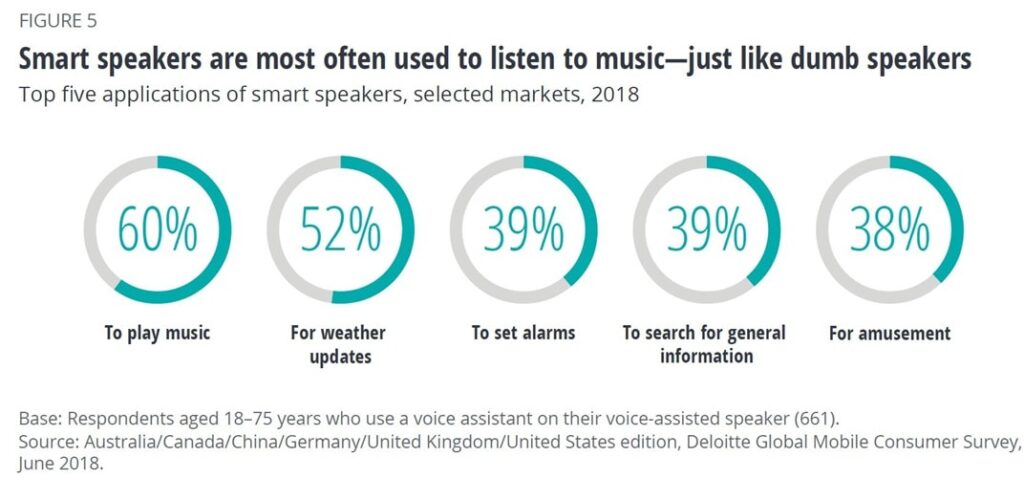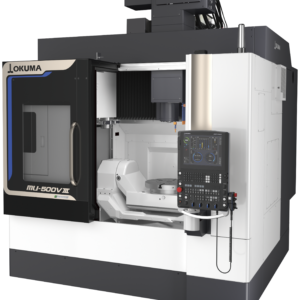Article by: Asst. Prof. Suwan Juntiwasarakij, Ph.D., MEGA Tech Senior Editor
เทคโนโลยีรู้จำเสียงทำให้ผู้บริโภคสามารถทำงานได้หลายอย่างในเวลาเดียวกันนั้นเป็นผลผลิตจากเทคโนโลยี Machine Learning ผสมผสานกับเทคนิคการเขียนโปรแกรมขั้นสูง บริษัทในกลุ่มเทคโนโลยีต่างก็สนใจที่จะทำให้เทคโนโลยีรู้จำเสียงเป็นมาตรฐานสำหรับผลิตภัณฑ์เครื่องใช้ไฟฟ้าของตน บริษัทเหล่านื้มีจุดมุ่งหมายที่จะสร้างระบบผู้ช่วยสั่งงานด้วยเสียงที่มีความสามารถในการโต้ตอบอย่างถูกต้องและถูกบริบท มากไปกว่านั้นได้มีผลการศึกษาวิจัยที่ยืนยันว่าระบบผู้ช่วยเสมือนที่สั่งการด้วยเสียงได้รับการพัฒนาต่อยอดอย่างไม่หยุดยั้ง

Source: GlobalWebIndex
How Does It Work?
ระบบรู้จำการสนทนานั้นเป็นเทคโนโลยีที่สามารถเข้าใจคำพูดซึ่งจะแปลงให้เป็นตัวอักษรในลำดับต่อไป ส่วนระบบรู้จำเสียงนั้นเป็นเพียงส่วนหนึ่งของระบบรู้จำการสนทนาแต่เพียงเท่านั้น งานหลักของซอฟต์แวร์ระบบรู้จำเสียง คือ การวิเคราะห์เสียงที่เกิดจากมนุษย์ เริ่มจากระบบกลั่นกรองเสียงพูด แปลงเสียงให้อยู่ในรูปสัญญาณดิจิตัลที่สามารถอ่านได้ จากนั้นจึงวิเคราะห์เพื่อค้นหาความหมาย ด้วยขั้นตอนที่กล่าวมานี้เองที่ทำให้เกิดความแม่นยำสูงในการประกอบสร้างความหมายเพื่อพยายากรณเอย่างแม่นยำว่าเสียงที่พูดออกมานั้นหมายถึงอะไร

Source: Baidu
บริษัทกลุ่มไฮเทคยักษ์ของโลก เช่น Facebook, Amazon, Microsoft, Google, Apple ได้นำเสนอและบรรจุเทคโนโลยีเทคโนโลยีรู้จำและสั่งงานด้วยเสียงดังกล่าวลงในอุปกรณ์ของตนเองอย่างเช่นผลิตภัณฑ์ Google Home, Amazon Echo, and Siri และบริษัทเหล่านี้ล้วนมีความพยายามที่จะทำให้ระบบรู้จำเสียงกลายเป็นองค์ประกอบที่ฝังอยู่ในสินค้าและผลิตภัณฑ์ของตน เป้าหมายหนึ่งที่บริษัทเหล่านี้มีร่วมกันคือการพัฒนาขัดเกลาทำให้ระบบช่วยเหลือรู้จำเสียงสามารถโต้ตอบกับมนุษย์ด้วยความถูกต้องแม่นยำสูงทั้งในเนื้อและบริบท

Source: Deloitte Mobile Consumer Survey
Smart Speakers
ลำโพงไร้สายที่ผนวกเข้ากับระบบผู้ช่วยเสมือนที่สั่งด้วยเสียง มีขีดความสามารถหลากหลาย ไม่ว่าเป็นการค้นหาข้อมูล การเล่นดนตรี การซ็อปป้ำงออนไลน์ ไม่ว่าจะทำอะไรนั้นก็จะขึ้นอยู่กับคำสั่งเสียงที่มาจากผู้ใช้งาน นับตั้งแต่ลำโพง “Echo” ซึ่งเป็นผลงานของ Amazon ที่เปิดตัวไปในปี 2015 นับว่าเป็นผู้บุกเบิกในด้านนี้ ยังคงได้รับความนิยมจากผู้บริโภคเพิ่มมากขึ้นเรื่อยๆ อย่างไรก็ดี “Google Home” ซึ่งเป็นผลงานของ Google ก็ได้ลงมาแข่งขันด้วย ส่งผลทำให้ตลาดมีความคึกคักมากขึ้น ทำให้ยอดตัวเลขการส่งและจำหน่ายสูงขึ้นอย่างมหาศาลจาก 6.57 ล้านหน่วยในปี 2016 เป็น 92.25 ล้านหน่วยในปี 2019 โดยตลาดที่ใหญ่ที่สุดเป็นของประเทศสหรัฐอเมริกา และที่ขนาดรองลงมาคือประเทศจีน

Source: Global smart speaker vendors’ market share 2016-2019, STATISTA
China: Where the Opportunities Grow
ตลาดลำโพงอัจฉริยะสั่งการด้วยเสียงมีโอกาสที่จะเติบโตไม่ว่าจะอยู่ในมุมใดของโลกก็ตาม โอกาสที่เกิดขึ้นดังกล่าวนี้เป็นผลมาจากการขยายตัวของตลาดไปสู่ประเทศที่ไม่ใช้ภาษาอังกฤษเป็นภาษาหลัก และในปลายปี 2017 พบว่ายอดขายลำโพงอัจฉริยะถูกจำกัดอยู่ในประเทศที่ใช้ภาษาอังกฤษเป็นภาษาหลัก โดยเป็นการขายที่เกิดขึ้นในประเทศสหรัฐอเมริกาและสหราชอาณาจักรถึง 95 เปอร์เซ็นต์ อย่างไรก็ตาม นับตั้งแต่ต้นปี 2019 ลำโพงอัจฉริยะและยอดการขายได้พุ่งทะยานมาจากตลาดในกลุ่มประเทศที่ใช้ภาษาจีน ภาษาฝรั่งเศษ ภาษาสเปน ภาษาอิตาเลี่ยน และภาษาญี่ปุ่นเป็นภาษาหลัก ด้วยมุมมองการตลาดเปรียบเทียบ เป็นที่ชัดเจนว่าการเติบของลูกเล่นการค้นหาด้วยเสียงเป็นปัจจัยสำคัญขับเคลื่อนตลาดที่สำคัญ โดยตลาดในประเทศอินเดีย ประเทศจีน และประเทศอินโดนีเซียมีขนาดใหญ่ในอันดับต้นของเอเชียตามลำดับ

Source: GlobalWebIndex

Source: Deloitte Global Mobile Consumer Survey
หลักเกณฑ์หนึ่งที่นำมาใช้เป็นตัววัดคุณค่าอรรถประโยชน์ก็คือความถี่ของการใช้งาน ในหกประเทศที่ปรากฎอยู่ในรูปด้านบนเป็นประเทศที่ใช้ลำโพงอัจฉริยะในชีวิตประจำอยู่เป็นประจำถึงแม้ว่าเป็นเพียงส่วนน้อยก็ตาม ประโยชน์ใช้สอยของลำโพงอัจฉริยะนั้นขึ้นอยู่กับว่าจะไปใช้ประยุกต์ใช้งานอย่างไร ส่วนใหญ่แล้วลำโพงอัจฉริยะสั่งการด้วยเสียงถูกใช้เพื่อเล่นเพลง ซึ่งก็ไม่ใช่แนวทางการใช้งานที่สร้างความแตกต่างหรือสั่นสะเทือนให้แก่ตลาดมากนัก และผลการสำรวจช่วงกลางปี 2018 ของ Deloitte ได้แสดงให้เห็นว่า 5 ใน 6 ประเทศ ใช้ลำโพงอัจฉริยะเพื่อการเล่นเพลงเป็นอันดับที่ 1 และใช้เพื่อตรวจสอบสภาพอากาศเป็นอันดับที่ 2 โดยมีแคนาดาเพียงประเทศเดียวที่อันดับ 1 และ 2 ตรงกันข้ามกับประเทศทั้งหมดในกลุ่ม

Source: Deloitte Global Mobile Consumer Survey
Take-Home Message
เมื่อพิจารณาอย่างถี่ถ้วนแล้วจะเห็นว่ายังมีความท้าทายเทคโนโลยีรู้จำเสียงอยู่ แต่ก็ไม่สามารถละเลยผลกระทบและอรรถประโยชน์ที่จะเกิดขึ้นในระยะยาวได้ ไม่ว่าจะฝังตัวอยู่ในอุปกรณ์ใดก็ตามระบบรู้จำเสียงและระบบผู้ช่วยสั่งการด้วยเสียงเป็นเสมือนหน้าประตูที่เปิดให้ผู้บริโภคทุกคนสามารถเก็บเกี่ยวใช้ประโยชน์จากจักรกลคอมพิวเตอร์ได้อย่างเต็มที่ เป็นไปได้ว่าในอนาคตผู้คนจะหันมาพูดคุยกับลำโพงเป็นจำนวนมาก ซึ่งมากกว่าที่เป็นอยู่ในปัจจุบัน และ “เสียง” พร้อมกับเทคโนโลยีรู้จำจะเป็นส่วนปฏิสัมพันธ์กับอุปกรณ์ต่างๆ และจะกลายมาเป็นส่วนปฏิสัมพันธ์หลักให้แก่ผู้ที่มีความท้าทายทางด้านการมองเห็น หรือมีประเด็นในการใช้คีย์บอร์ดหรือปุ่มกดขนาดเล็ก และเป็นเทคโนโลยีที่มีประโยชน์มากกับสังคมผู้สูงอายุ












